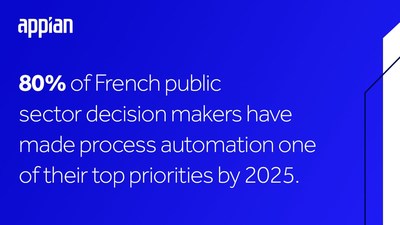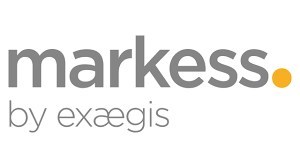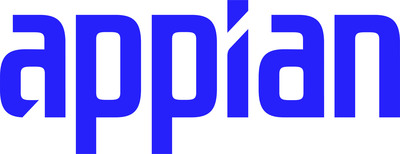News Release
80% of public sector decision makers in France rank process automation as a high priority for their organization
An Appian study, in partnership with Markess, reveals the importance of end-to-end automation and low-code practices to digitize public services
The need to improve and digitize workflows within public sector organizations is recognized by 76% of those surveyed in central government and 83% in local government. Although digital management systems are often used to store public records, a lack of interconnectivity and automation often constitute key barriers to effective implementation. This includes obstacles such as non-interoperable application environments, the need to manually enter data, workflow complexity and data variety, plus lack of training.
"Although most public decision makers are not yet equipped with advanced automation solutions, including business process automation (BPM), robotic process automation (RPA), and artificial intelligence, by 2025 this will no longer be the case. As we continue to face new and unexpected business challenges, the need to invest in automation tools will be undeniable," explains Aurélie Courtaudon, head of the study for Markess by Exaegis.
Public administrators desire to adopt process automation technology, with motivations categorized into three prominent areas:
- 47% of respondents agree that digitization and process automation offer the opportunity to optimize and simplify workflows and make data more reliable.
- 45% of respondents say that this technology would allow agents to spend more time on tasks with greater added value, such as helping citizens and resolving more complex cases.
- 43% of public decision maker respondents believe that automation enhances a citizen's experience because it enables online self-service and helps expedite case processing.
While 80% of respondents recognize the potential for automation as a key part of digitization, many do not have sufficient knowledge of the range of enterprise software tools and methodologies available. Excluding workflow which is already adopted by about 63% of respondents, few administrations have applied BPM (24%), automatic document recognition and classification (22%), RPA (33%), artificial intelligence (20%), case management (22%), or process mining (2%) solutions.
Through automating processes, public decision makers understand they can get more out of their existing technology by executing tasks in a new way:
- The majority of decision makers in French national ministries and central agencies are in favor of covering new areas that have not yet been digitized (57%) or recommending digitization on a broad level and thus having a 360° view of all flows (52%).
- Local authority decision makers are more "backward" in the two contexts outlined above, prioritizing operational needs before considering digitizing new sectors or operating on a 360° vision principle (43%).
When reflecting on existing applications and those under development, public decision makers reveal the key obstacles they're currently facing:
- Projects are too spread out over time (56%).
- A lack of skills and resources (44%).
- Rigid and not very adaptable business software (38%).
Low-code technology is less well known among survey respondents, with only 35% saying that their administration is already using a low-code platform or considering it by 2025. The remaining respondents do not consider it a priority, do not have a thorough knowledge of the technology, or are not familiar with it.
In the context of changing demands, rising citizen and business expectations, increasingly complex processes, and continuous regulatory challenges, agility is essential for public administrators. The adoption of low-code platforms presents a solution to this, enabling rapid innovation for both application development and end-to-end process automation.
"Appian is committed to supporting the public sector in its transformation efforts," said
Download the full "Public Sector: what perspectives to automate processes and optimize application development?" French report and register for a webinar on
About the study:
The data presented in the Markess study was collected for Appian and is the result of interviews conducted online with 50 public decision makers (business divisions, general divisions, IT divisions and digital divisions within ministries, supervisory bodies, health institutions, local authorities, etc.).
The respondent panel is made up of 46% of decision makers from ministries, agencies, operators, and 54% of decision makers from local authorities (regions, departments, municipalities, and their agglomerations/metropolises).
The decision makers were interviewed between March and
About Appian
Appian is the unified platform for change. We accelerate customers' businesses by discovering, designing, and automating their most important processes. The Appian Low-Code Platform combines the key capabilities needed to get work done faster, Process Mining + Workflow + Automation, in a unified low-code platform. Appian is open, enterprise-grade, and trusted by industry leaders. For more information, visit appian.com.
Follow Appian: Twitter, LinkedIn.
Follow Appian
![]() View original content to download multimedia:https://www.prnewswire.com/news-releases/80-of-public-sector-decision-makers-in-france-rank-process-automation-as-a-high-priority-for-their-organization-301627806.html
View original content to download multimedia:https://www.prnewswire.com/news-releases/80-of-public-sector-decision-makers-in-france-rank-process-automation-as-a-high-priority-for-their-organization-301627806.html
SOURCE Appian
Cindy Cheng, Sr. Director of Communications, EMEA, pr.emea@appian.com



